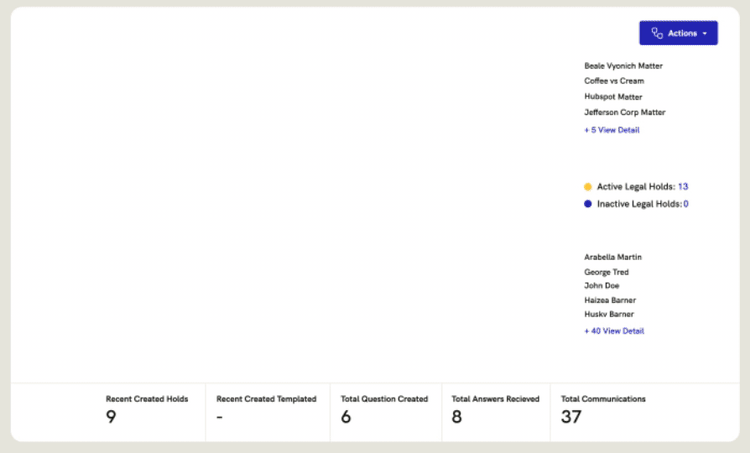Organizations can no longer create and send legal hold notices in Microsoft 365 (M365). M365 removed legal hold communications and workflows, including notices, reminders, and acknowledgements on August 31, 2025, in favor of a “new eDiscovery experience” inside the Purview portal, according to Microsoft.
The change is a major blow to legal teams. It has already interrupted workflows and created legal risks by undermining such a foundational feature set.
A Drastic Impact to Workflow
Take a look at how Microsoft described the now-removed communications suite to get a sense of what all of this entails:
Using eDiscovery (Premium) custodian communications, organizations can manage their workflow around communicating with custodians. Through the Communications tool, legal teams can systematically send, collect, and track legal hold notifications. The flexible creation process also allows teams to customize the hold notification workflow and the content in the notices sent to custodians.
You can still put custodians on hold and place data (M365 only) on hold. But there’s no ability to manage the communication lifecycle — send notices/reminders/follow-ups/questionnaires, track acknowledgements, store templates, and have access to status tracking — an obvious core set of features.
It breaks workflows. And, unfortunately, not in the sense that one function is now removed. A suite of functions has been removed, forcing professionals to find new ways of managing legal holds. Many teams are scrambling, whether that means sending emails manually and tracking responses in spreadsheets, or possibly finding another tool to add to the tech stack.
On top of the administrative burden, organizations have lost the built-in defensible notification system and audit trail. Without those features, there are greater risks to an organization’s legal hold function.
Legal and Compliance Consequences
There are two broad areas of risk that are increased as a result of M365 removing legal hold communications:
-
Missed or untracked notifications that weaken defensibility
-
Lack of evidence showing custodians were notified or reminders sent, undermining the audit trail
If custodians aren’t aware that they need to preserve data, organizations face heightened legal risk. The practical consequence is increased spoliation risk. When custodians are not instructed to preserve materials, employees may delete messages or files and automated retention or cleanup processes may purge data. Those losses invite judicial scrutiny. Under Federal Rule of Civil Procedure 37(e), courts may impose sanctions if “a party failed to take reasonable steps to preserve it,” such as issuing a timely hold for “electronically stored information that should have been preserved in the anticipation or conduct of litigation.”
This is supported in case law as well. The seminal case Zubulake v. UBS Warburg (S.D.N.Y. 2003) established that “once a party reasonably anticipates litigation, it must suspend its routine document retention/destruction policy and put in place a litigation hold to ensure the preservation of relevant documents.” Subsequent cases, including VOOM HD Holdings LLC v. EchoStar Satellite L.L.C. (N.Y. App. Div. 2012) and Sekisui American Corp. v. Hart (S.D.N.Y. 2013), imposed sanctions for late or inadequate holds.
Where M365 Falls Short — And How Teams Have Responded
When M365 removed legal hold communications, it further impaired how legal teams can function.
Why “further?” If we consider performance and how the tool functions beyond legal holds, there are several shortcomings. Take a look at our blog about how M365 isn’t the answer for eDiscovery for more about performance issues, file support, and how a court called out M365’s limitations around search results. M365 simply isn’t a solution for either legal holds or eDiscovery, and certainly not both.
Organizations solve those types of challenges with Casepoint, integrating end-to-end eDiscovery with legal holds, data management and storage, and more in one platform. Here are a few highlights for Casepoint Legal Hold:
-
Integrated, automatic notifications for legal hold notices, scheduled reminders and escalations
-
Full tracking and accountability for communications to produce a full defensible audit trail
-
Hundreds of data connectors for popular cloud data applications, including M365 integration, for seamless and automatic data collection
-
Templates, questionnaires, dashboard and reporting, and more

The Casepoint platform is a powerful enterprise application that corporate and government organizations trust. Security is also unmatched. Casepoint has achieved the highest levels of security standards and certifications — including FedRAMP® High and DOD Impact Level 5 and 6, which no other platform in the industry has (any of them).
Author
Director, Product Solutions
With over 13 years of experience in SaaS software and Customer Success, Brock Carrier has a proven track record of successful customer implementations, support, and services. Before joining Casepoint, Brock played a pivotal role in these areas for Zapproved and other SaaS companies, using customer feedback to drive product improvements and solve…
Categories:
